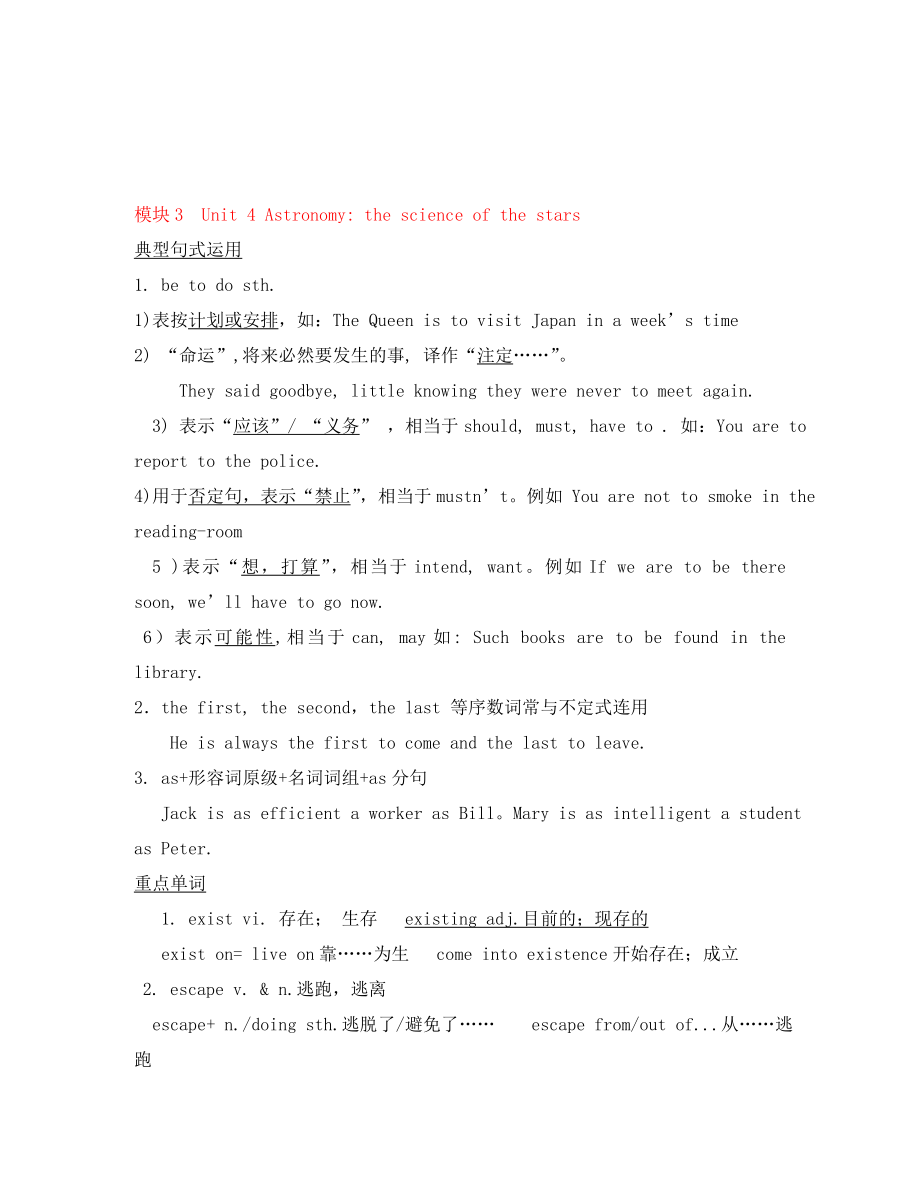《2020高中英語 短語知識(shí)點(diǎn) Unit 4 Astronomy the science of the stars學(xué)案 新人教版必修3》由會(huì)員分享����,可在線閱讀��,更多相關(guān)《2020高中英語 短語知識(shí)點(diǎn) Unit 4 Astronomy the science of the stars學(xué)案 新人教版必修3(3頁珍藏版)》請?jiān)谘b配圖網(wǎng)上搜索。
1�����、
模塊3 Unit 4 Astronomy: the science of the stars
典型句式運(yùn)用
1. be to do sth.
1)表按計(jì)劃或安排��,如:The Queen is to visit Japan in a week’s time
2) “命運(yùn)”,將來必然要發(fā)生的事, 譯作“注定……”�����。
They said goodbye, little knowing they were never to meet again.
3) 表示“應(yīng)該”/ “義務(wù)” ��,相當(dāng)于should, must, have to . 如:You are to report to th
2�����、e police.
4)用于否定句��,表示“禁止”�����,相當(dāng)于mustn’t。例如 You are not to smoke in the reading-room
5 )表示“想����,打算”,相當(dāng)于intend, want�����。例如If we are to be there soon, we’ll have to go now.
6)表示可能性,相當(dāng)于can, may如: Such books are to be found in the library.
2.the first, the second��,the last 等序數(shù)詞常與不定式連用
He is always the first to
3��、 come and the last to leave.
3. as+形容詞原級(jí)+名詞詞組+as分句
Jack is as efficient a worker as Bill�。Mary is as intelligent a student as Peter.
重點(diǎn)單詞
1. exist vi. 存在; 生存 existing adj.目前的����;現(xiàn)存的
exist on= live on靠……為生 come into existence開始存在;成立
2. escape v. & n.逃跑����,逃離
escape+ n./doing sth.逃脫了/避免了…… esca
4、pe from/out of...從……逃跑
sth. escape sb.……被某人遺忘�;未被注意 a narrow escape九死一生
3. mass n. (聚成一體的)團(tuán);塊;大多數(shù); 質(zhì)量; 群眾; 大量
1)a mass of/masses of大量的(可數(shù),不可數(shù)均可)= plenty of, , a quantity of, quantities of
2)the mass media 大眾傳媒 3)mass production 批量生產(chǎn)
4.break out 突發(fā);爆發(fā)�。
break up 關(guān)系的破裂����,打碎���;解散�;放假
break down (機(jī)器的
5��、)故障����;(精神����、身體)崩潰;(談判����,計(jì)劃)失敗
break off 停止,中斷 break in 闖入�;插話
break into 強(qiáng)行進(jìn)入某處;突然開始(大笑����、歡呼等)
break through 突破��;強(qiáng)行穿過 break away from...脫離……
5. in time 及時(shí)����;最終,早晚
in no time 立即���;馬上 at no time 絕不
at a time 一次����;每次 at one time 曾經(jīng)����;一度
at times 有時(shí) ahead of time 提前
for the tim
6、e being 暫時(shí) take one’s time 別著急���;慢慢來
It’s high time that sb. did/should do sth.
6. 區(qū)分 now that, because, since, as, for
1)Because 直接的原因�����,有較強(qiáng)的因果關(guān)系���。(2)As 由于,比because 弱�����。
(3)now that“既然;由于”that可省略 ,強(qiáng)度更弱
(4)since 既然����,表既成的事實(shí),可與now that互換�。
(5) for 因?yàn)?并列連詞,前面用逗號(hào)與主句隔開,補(bǔ)充說明原因���。
7. violent criminals: 使
7、用暴力的罪犯 a violent attack: 猛烈的攻擊
a violent protest:強(qiáng)烈的抗議 a violent struggle����; 激烈的斗爭
violent winds and storms 狂風(fēng)暴雨 violent toothache: 劇烈的牙痛
8. unlike 介詞,不同����,不像 dislike 討厭,不喜歡
9. pull: 拖����,拉,牽引
pull sth. down: 拆毀 pull in/into: 駛進(jìn)��,駛近 pull out 駛出,退出
pull over: 使車閃到一邊
8�、pull up ; 使停下�,
10. Now (that)/ seeing (that)/considering (that) / in that
鑒于某個(gè)事實(shí),原因是��,用法與since接近
not that…but that… 不是因?yàn)?����,而是因?yàn)? on ground(s) that 理由是
11. get the hang of: 熟悉�����,理解�,掌握
=have a good knowledge of =have a good command of
12. dissolve: 溶解,解散 13 .extinct:滅絕的���,
14.lessen the pressure from study:減輕����;減少 15. exhaust: 用盡�����,耗盡
 2020高中英語 短語知識(shí)點(diǎn) Unit 4 Astronomy the science of the stars學(xué)案 新人教版必修3
2020高中英語 短語知識(shí)點(diǎn) Unit 4 Astronomy the science of the stars學(xué)案 新人教版必修3

